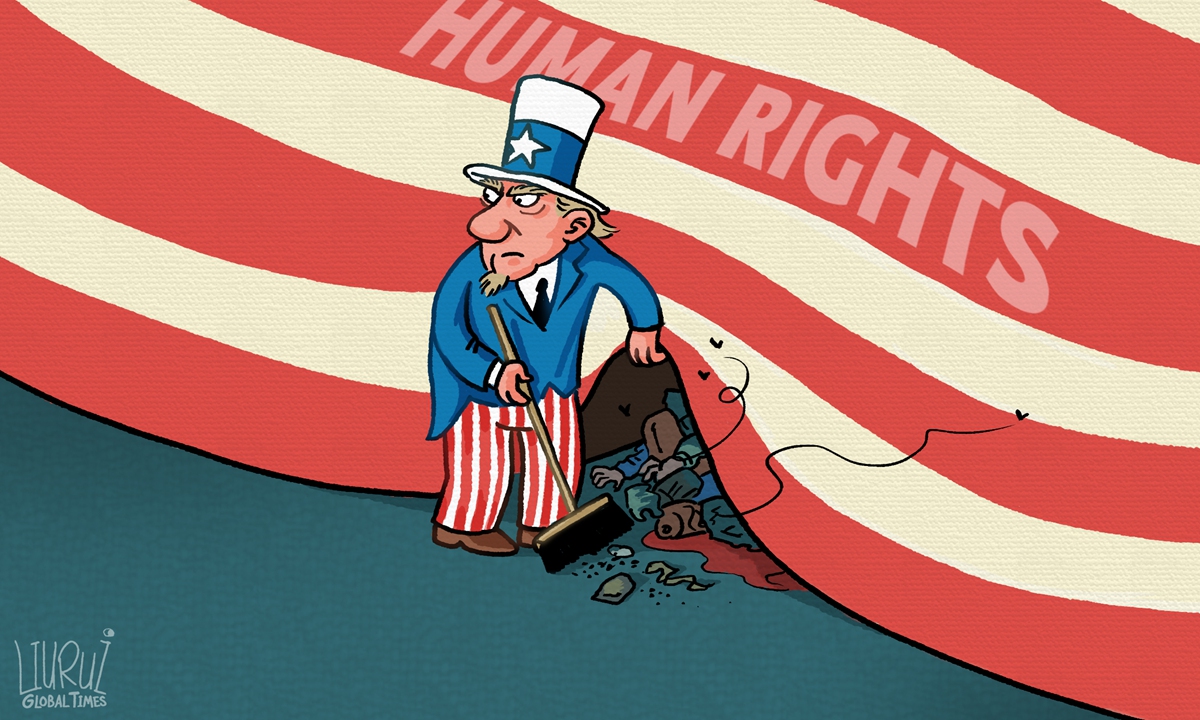
Look, Uncle Sam is busy cleaning up its own mess on human rights problems. Does the US still think it's the beacon of human rights? Illustration: GT
On Tuesday, the US State Department released its annual Country Reports on Human Rights Practices. This set of reports criticized the so-called human rights violations in some of the main targets of the US' geopolitical attacks, including China, Russia, Myanmar, Venezuela and Belarus. It also made blatant accusations of "genocide" and "crimes against humanity" in Northwest China's Xinjiang Uygur Autonomous Region.
During the press conference on the report, US Secretary of State Antony Blinken seemingly wanted to show the difference from the previous state department's reckless approach. He said that the Biden administration "will stand against human rights abuses wherever they occur, regardless of whether the perpetrators are adversaries or partners." He admitted that the US also "has work to do at home," including combating systemic racism. However, he then emphasized that Washington deals with its problems "in the daylight, with full transparency." What he meant was that the nature of human rights issues in the US is different from those of other countries. He said it with a touch of boasting.
The US feels best about itself on topics about human rights. But the country's relevant words and deeds have increasingly become a double-standard show in the spotlight. While the US touched upon its own systemic racism with a commendatory sense, it viciously branded China's de-extremism efforts in Xinjiang as "genocide" and "crimes against humanity." The US accused its ally Saudi Arabia of murdering journalist Jamal Khashoggi brutally by destroying his body, and also accused Russia of persecuting Russian opposition leader Alexei Navalny. However, the accusations and punitive actions taken by Washington in these two cases are entirely different.
If country reports on human rights practices are needed, it is supposed to be the duty of the UN. Yet, Washington has become a back-seat driver. It is mainly out of the US' intent to pursue its geopolitical interests. The US needs to portray itself as a "beacon" to serve its hegemony. And the right to define human rights is the cornerstone of maintaining this "beacon of light."
Due to its failure in handling the epidemic, the US witnessed the most deaths from COVID-19 in the world in 2020. And racism seems to have resurfaced. It is the time when the US feels the most diffident. Against this backdrop, the US needs to make bigger waves in terms of human rights this year.
China's fight against the epidemic has been the most successful in the world in 2020. The country has remarkably reduced the numbers of infected cases and deaths. This achievement alone deserves a high score when China's human rights record is being evaluated. Instead of revealing how much loss and suffering the US' own governance has brought to the public, it has been busy accusing some details in China's anti-epidemic practices as "violating" human rights. This is totally political sophistry.
The US narrative of human rights has been fundamentally questioned and opposed by the vast majority of developing countries. The US' own performance in this regard is terrible. Its geopolitical selfishness when discussing the so-called human rights issues is obvious. Its proposal is a far cry from other countries' actual situation in their development of human rights. All this severely dismantles the US moral basis to dominate global human rights affairs.
The US itself has failed in human rights issues, but it is fond of lecturing others. The world is increasingly annoyed by US claiming the role of the UN Human Rights Council to set the world's standards.
Washington is hostile in using the "genocide" and "crimes against humanity" allegations on China of its governance in Xinjiang. It is the first government to make such a vicious claim, which makes its other diplomatic rhetoric to balance its harm to China look disingenuous. China should be vigilant. The extreme US accusations against China are aimed at leading the international community to deny the legitimacy of the Chinese government.
Dialogues on human rights between China and the US have been made meaningless. In the field of human rights, there is nothing left for the two sides apart from a tit-for-tat struggle. To win this, China needs to focus more on efforts beyond the US and gain more understanding from the Western public of China's human rights development methods, and in particular to win the understanding and recognition from developing countries. The way we introduce and present ourselves needs to be more open and pragmatic.
It should be noted that China and the US are no longer engaged in human rights frictions like they did in early years, but are in a strategic game on the human rights battlefield. We must not lower our guard. And China must not lose.




